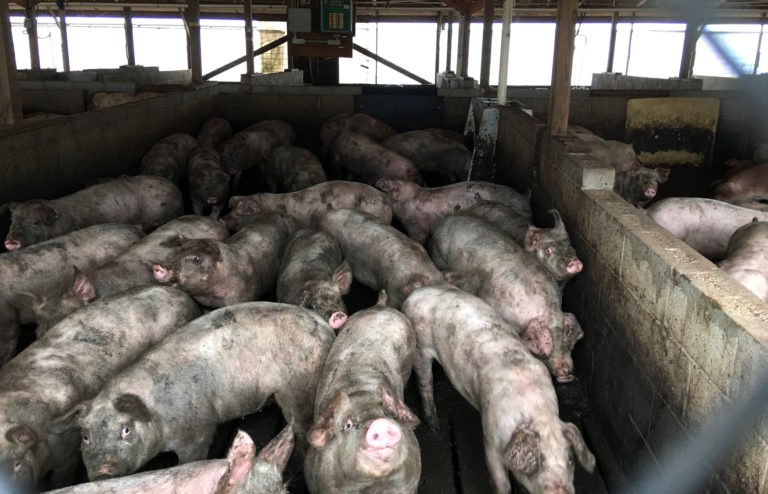Op-Ed: We Must Shut Down Factory Farms to Protect Clean Water and Environmental Justice
By: Gloria Reuben

by Gloria Reuben
For years, Americans have been served an image of an idyllic family farmer who is responsible for the food that makes its way to our homes. Unfortunately, for the majority of the food we eat, that image is not based in reality. The truth is that food production, especially industrial animal agriculture, is causing an ecological crisis in our waterways that further perpetuates the legacy of environmental racism. And it needs to stop.
The overwhelming majority of today’s U.S. food systems are dominated by a handful of international corporations. These profit-driven enterprises often employ industrialized methods, such as concentrated animal feeding operations, or CAFOs, where animals are “produced” in incredibly cramped and unsafe facilities.
CAFOs are a formidable threat to the health of our nation’s waterways, representing one of the largest unaddressed sources of nitrogen and phosphorus pollution in the United States. Their uncontrolled — and mostly unregulated — discharges into waterways lead to harmful algal blooms, which in turn impair drinking water supplies, fisheries and recreational waters across the country. Look no further than Lake Erie, the Chesapeake Bay, the Mississippi River Basin, North Carolina’s coastal estuaries, and many other inland and coastal waters that are already gravely affected. Aside from the damages done to safe drinking water and human health, it’s also really expensive. Harmful algal blooms alone can negatively impact economies by as much as $4 billion a year.
Just one of these animal factories can produce as much animal waste as a large city with millions of people. According to a 2013 study, it adds up to 1.1 billion tons of animal waste every year. At many of these facilities, the animal waste is stored in unlined lagoons that inevitably pollute groundwater. In many cases, the excess waste is applied to agricultural fields far beyond what is needed to grow food, resulting in pollution of nearby surface waters and groundwater. Some facilities even go so far as to haphazardly spray the excess waste onto fields, creating a hellish experience for the neighboring communities.
Picture homes, schools and parks covered in airborne liquified animal waste. Imagine windows shut tight in the middle of the summer because of the overwhelming odors. Consider the countless lives burdened by respiratory diseases. Think of all the rivers and streams poisoned with pathogens.
It is worth noting that CAFOs are not found everywhere. Instead, they are predominantly located in rural areas, often in communities of color. They are purposefully located here because these frontline communities often lack the political clout to stop them. The CAFOs are constructed quickly, with minimal community input and, once operational, are ostensibly shielded from any kind of transparency, oversight or consequences. For example, in North Carolina, General Statute 106-24.1 shields the state’s agriculture industry by making any information collected or published by the Department of Agriculture and Consumer Services classified from the public. But it’s not just North Carolina. There are “ag-gag” laws on the books in several states.
The CAFO crisis is funded by huge corporations, such as Smithfield Foods, and abetted by politicians who choose to look the other way. Like so many of the catastrophes affecting frontline communities and waterways, it’s a nightmare of our government’s own making, which means we also have the power to correct it. We always have a choice, and it’s possible to make the changes we need.
The most effective way to legislatively confront the CAFO crisis would be for the U.S. Environmental Protection Agency (EPA) to use the Clean Water Act to prevent uncontrolled discharges of untreated animal waste into our nation’s water by requiring these facilities to obtain permits that contain real limits. The Clean Water Act has had so many successes during its 50 years, just imagine what could happen if we fully implemented and enforced it. Unfortunately, the EPA has thus far failed to respond to pressure, so environmental groups are suing in order to force the regulator to take action on clean water rules governing factory farms.
We can also urge our members of Congress to go further and pass real legislation, such as the Farm System Reform Act, which would help rein in the monopolistic practices of the agriculture industry, invest billions in a more resilient food system, and finally start transitioning us away from CAFOs to more regenerative practices by truly independent farmers and ranchers.
Finally, we can and should encourage the industry to change their ways by pulling our purse strings. As the saying goes, money talks, and these companies must be forced to listen. We don’t always have to purchase food from corporations that are contributing to this CAFO crisis. For those who are able to pay a little bit more at the grocery store, just think of all you can save.
This article originally appeared in Truthout on October 19, 2022. Copyright, Truthout.org.